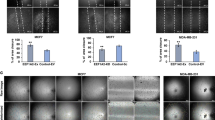Abstract
The translation initiation factor eIF4E is a novel proto-oncogene found over expressed in most breast carcinomas (Kerekatte et al., 1995), but the pathology where this elevation is initially manifested and its possible role in cancer progression are unknown. We report that eIF4E is markedly increased in vascularized malignant ductules of invasive carcinomas, whereas necrotic and avascular ductal carcinomas in situ display significantly lower levels. eIF4E facilitates the synthesis of FGF-2, a powerful tumor angiogenic factor. Conversely, reducing eIF4E with antisense RNA in MDA-435 cells suppresses their tumorigenic and angiogenic properties, consistent with loss of FGF-2 synthesis. These findings suggest a causal role for eIF4E in tumor vascularization.
Similar content being viewed by others
Author information
Authors and Affiliations
Rights and permissions
About this article
Cite this article
Nathan, CA., Carter, P., Liu, L. et al. Elevated expression of eIF4E and FGF-2 isoforms during vascularization of breast carcinomas. Oncogene 15, 1087–1094 (1997). https://doi.org/10.1038/sj.onc.1201272
Received:
Accepted:
Issue Date:
DOI: https://doi.org/10.1038/sj.onc.1201272
- Springer Nature Limited
Keywords
This article is cited by
-
Implication of 4E-BP1 protein dephosphorylation and accumulation in pancreatic cancer cell death induced by combined gemcitabine and TRAIL
Cell Death & Disease (2017)
-
Oncofetal protein IGF2BP3 facilitates the activity of proto-oncogene protein eIF4E through the destabilization of EIF4E-BP2 mRNA
Oncogene (2016)
-
Phosphorylation of eIF4E promotes EMT and metastasis via translational control of SNAIL and MMP-3
Oncogene (2015)
-
Targeting the translation machinery in cancer
Nature Reviews Drug Discovery (2015)
-
Integrin αvβ6 sets the stage for colorectal cancer metastasis
Cancer and Metastasis Reviews (2015)




